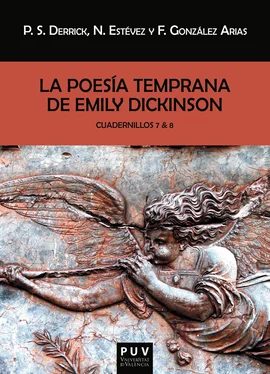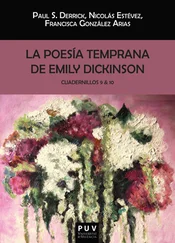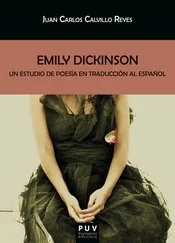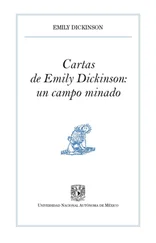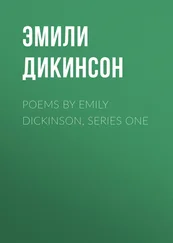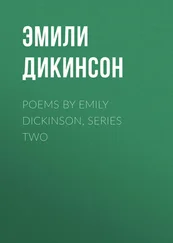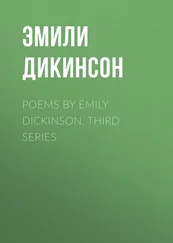De los que nunca he oído?
¡O, Erudito! ¡O, Marinero!
¡O, Sabio de los cielos!
¡Dígale a una pequeña Peregrina
Dónde el lugar llamado “mañana” está!
1860
F7-P5-J102-Fr149
Great Caesar! Condescend
The Daisy, to receive,
Gathered by Cato’s Daughter,
With your majestic leave.
1860
C7-P5-J102-Fr149
¡Ilustre César! Dignaos
Recibir, a la Margarita, 5
Recogida por la hija de Catón,
Con vuestro solemne permiso.
1860
F7-P6-J103-Fr157
I have a King, who does not speak –
So – wondering – thro’ the hours meek
I trudge the day away –
Half glad when it is night – and sleep –
If, haply, thro’ a dream, to peep
In parlors, shut by day.
And if I do – when morning comes –
It is as if a hundred drums
Did round my pillow roll,
And shouts fill all my Childish sky,
And Bells keep saying ‘Victory’
From steeples in my soul!
And if I don’t – the little Bird
Within the Orchard, is not heard,
And I omit to pray
‘Father, thy will be done’ today
For my will goes the other way,
And it were perjury!
1860
C7-P6-J103-Fr157
Tengo un Rey, que no habla –
Así – curiosa – por las humildes horas
Camino fatigosa todo el día –
Medio alegre cuando llega la noche – y duermo –
Por si, quizás, en un sueño, espío
Salones, cerrados de día.
Y si lo hago – al llegar la mañana –
¡Es como si cien tambores
Redoblaran alrededor de mi almohada,
Y todo mi cielo Infantil de gritos se llenara,
Y las Campanas siguieran diciendo “Victoria”
Desde las torres de mi alma!
Y si no lo hago – al pequeño Pájaro
Dentro del Huerto, no se oye,
Y hoy dejo de rezar
‘Padre, hágase tu voluntad’
¡Porque mi voluntad por otro lado se va,
Y sería perjurio!
1860
F7-P7-J104-Fr158
Where I have lost, I softer tread –
I sow sweet flower from garden bed –
I pause above that vanished head
And mourn.
Whom I have lost, I pious guard
From accent harsh, or ruthless word –
Feeling as if their pillow heard,
Though stone!
When I have lost, you’ll know by this –
A Bonnet black – A dusk surplice –
A little tremor in my voice
Like this!
Why, I have lost, the people know
Who dressed in frocks of purest snow
Went home a century ago
Next Bliss!
1860
C7-P7-J104-Fr158
Donde he perdido, piso más suave –
Siembro dulce flor de jardín –
Me detengo sobre esa cabeza desaparecida
Y lloro.
Al que he perdido, piadosa guardo
De acento duro, o palabra despiadada –
Sintiendo como si su almohada oyera
¡Por la piedra!
Cuando haya perdido, lo sabrás por esto –
Una Toca negra – una túnica oscura –
Un ligero temblor en mi voz
¡Así!
Porque, he perdido, la gente sabe
Los que vestían trajes de la nieve más pura
Volvieron a casa hace un siglo
¡Después Dicha!
1860
F7-P8-J149-Fr159
She went as quiet as the Dew
From an Accustomed flower.
Not like the Dew, did she return
At the Accustomed hour!
She dropt as softly as a star
From out my summer’s Eve –
Less skillful than Le Verriere
It’s sorer to believe!
1860
C7-P8-J149-Fr159
Se fue tan callada como el Rocío
De una flor Acostumbrada. 6
¡No volvió, como el Rocío
A la hora Acostumbrada!
Cayó tan suave como una estrella
De mi Noche de verano –
Menos hábil que Le Verrier 7
¡Más duro es creer!
1860
F7-P9-J105-Fr160
To hang our head – ostensibly –
And subsequent, to find
That such was not the posture
Of our immortal mind –
Affords the sly presumption
That in so dense a fuzz –
You – too – take Cobweb attitudes
Opon a plane of Gauze!
1860
C7-P9-J105-Fr160
Bajar la cabeza – al parecer –
Y después, encontrar
Que no era tal la postura
De nuestra mente inmortal –
Ofrece la astuta conjetura
Que en tan densa pelusa –
¡Tú – también – con aires de Telaraña
Sobre un plano de Gasa!
1860
F7-P10-J106-Fr161
The Daisy follows soft the Sun –
And when his golden walk is done –
Sits shyly at his feet –
He – waking – finds the flower there –
Wherefore – Marauder – art thou here?
Because, Sir, love is sweet!
We are the Flower – Thou the Sun!
Forgive us, if as days decline –
We nearer steal to Thee!
Enamored of the parting West –
The peace – the flight – the Amethyst –
Night’s possibility!
1860
C7-P10-J106-Fr161
La Margarita sigue suave al Sol –
Y cuando termina su paseo dorado –
Se sienta tímidamente a sus pies –
Él – al despertar – encuentra ahí la flor –
¿Por qué –Vagabundo– estás aquí?
Porque, Señor, ¡dulce es el amor!
Nosotros somos la Flor – ¡Tú el Sol!
¡Perdónanos, si al declinar los días –
Nos acercamos más a Ti!
Enamorados del Oeste que se va –
La paz – el vuelo – la Amatista –
La Noche ¡su posibilidad!
1860
F7-P11-J60-Fr150
Like her the Saints retire,
In their Chapeaux of fire,
Martial as she!
Like her the Evenings steal
Purple and Cochineal
After the Day!
“Departed” – both – they say!
i.e, gathered away,
Not found,
Argues the Aster still –
Reasons the Daffodil
Profound!
1860
C7-P11-J60-Fr150
Como ella los Santos se retiran,
En sus Chapeaux de fuego,
¡Tan marciales como ella!
Como ella las Noches hurtan
Púrpura y Carmesí
¡Después del Día!
¡”Partidos” – ambos – dicen!
i.e, recogidos,
No hallados,
La Margarita aún discute –
Razona el Narciso
¡Profundos!
1860
F7-P12-J61-Fr151
Papa above!
Regard a Mouse
O’erpowered by the Cat!
Reserve within thy kingdom
A “Mansion” for the Rat!
Snug in seraphic Cupboards
To nibble all the day,
While unsuspecting Cycles
Wheel solemnly away!
1860
C7-P12-J61-Fr151
¡Papá allá arriba!
¡Mira un Ratón
Vencido por el Gato!
¡Reserva en tu reino
Una “Mansión” para la Rata!
Cómoda en angelicales alacenas
Mordisqueando todo el día,
¡Mientras confiadas Ruedas
Solemnes girando van!
1860
F7-P13-J107-Fr152
’Twas such a little – little boat
That toddled down the bay!
’Twas such a gallant – gallant sea
That beckoned it away!
’Twas such a greedy, greedy wave
That licked it from the Coast –
Nor ever guessed the stately sails
My little craft was lost !
1860
C7-P13-J107-Fr152
¡Era una barca tan pequeña – tan pequeña
Que tambaleaba bahía abajo!
¡Era un mar tan gallardo – tan gallardo
Que la atrajo al más allá!
Era una ola tan codiciosa – tan codiciosa
Que se la chupó de la Costa –
¡Ni las majestuosas velas adivinaron
Que mi barquita perdida estaba!
Читать дальше
